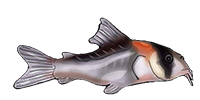Though I can't go back all that far in years with my experience in the hobby (late 80's or around there), by then, Pterygoplichthys were already the dominant common by then from what I can remember. I do have a couple older books that seem to accurately identify the pictured suckers as H.plecostomus anyway, and I may be able to access those books for scanning soon.
For the last several years now, I have been paying close attention to imported "common ple cos", and I currently keep 4 of them. The most common species I run across look VERY similar to H.robinii, including one of my own. These may actually be farmed even today, as I used to see new batches of these show up in local shops that just looked way too good to be fresh imports. Along with that fish I have one that's a dead-ringer for the
pictured in the e-log, another that's slimmer with larger spots that shares the lyre-tail of the H.plecostomus but has a larger dorsal fin, and the largest male that's somewhat long-bodied and has very small spots in comparison to the others.
Now I can't say for certain what species ANY of my 4 fish are, but I can say with certainty that they represent 4 different species. None of which looked much like the juvies pictured in the
entry for the e-log though..
racoll wrote:I think the common
Hypostomus spp. imported now are from Colombia (
) and Peru (can't remember the L number).
I agree that a many, if not all of the imports are coming from these 2 countries today, but only one of the many hundreds to possibly thousands I've seen for myself was H.plecostomoides. Of course this is in the US, these cheap imported Hypostomus may not be quite so cheap overseas...which might lead to the more unusual species like the Cochliodon-types showing up more often?













